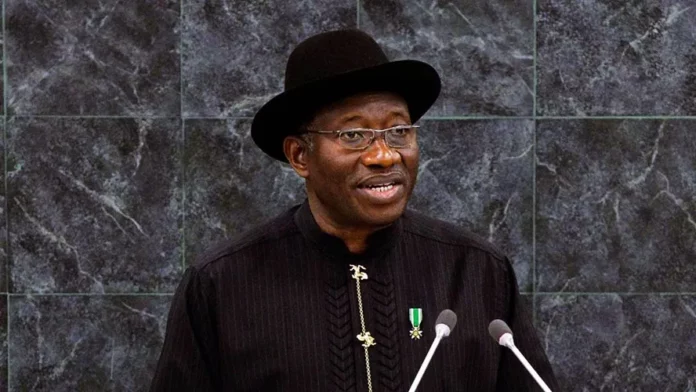Former President Goodluck Jonathan has warned that Nigeria’s democracy is under threat from what he described as reckless and unruly political behaviour. He said politics should not be treated as a space for disorderly conduct but as a platform for responsible leadership, national development and peacebuilding.
Jonathan made the remarks on Thursday at the 10th anniversary dinner of the Goodluck Jonathan Foundation, which also served as a celebration of his 68th birthday. The event drew prominent African statesmen, diplomats, political figures and business leaders from within and outside the continent.
Speaking to the distinguished audience, Jonathan said the rising wave of provocative rhetoric and hostile political actions in the country is weakening the foundations of democracy and making governance more difficult.
“Politics is not for rascals. It is for people who want to build, not destroy,” he warned. “Our democracy is being suffocated by reckless actors who do not understand that leadership must be rooted in responsibility, restraint and the desire to move the nation forward.”
Jonathan’s comments reflect growing concerns across Nigeria about the tone and direction of political engagement. In recent years, the country has seen an increase in bitter political exchanges, misinformation, ethnic tensions and extreme partisanship. Many citizens and analysts believe this trend is damaging the country’s political culture and affecting the ability of leaders to govern effectively.
The former president stressed that democracy cannot thrive in an atmosphere where political actors constantly attack one another without offering clear solutions to the country’s problems. He argued that political leaders should demonstrate maturity, discipline and respect for democratic institutions.
“Sustaining democratic stability requires civility and a genuine sense of accountability from all political actors,” he said. “We must protect the democratic process from those who use politics as a tool for destruction.”
Jonathan also used the event to reflect on the journey of his foundation, which was established after he left office in 2015. The Goodluck Jonathan Foundation has focused on governance reforms, peacebuilding, mediation, diplomacy and the strengthening of democratic institutions across Africa.
He explained that his experiences during and after his presidency inspired him to set up an organisation dedicated to supporting peaceful transitions of power and promoting good governance. The foundation has since been involved in international mediation efforts, election observation missions and regional dialogues aimed at reducing conflict and promoting peace in Africa.
Jonathan said the foundation’s work over the past decade has highlighted the need for African countries to invest more in building strong institutions and promoting dialogue during political disagreements.
The former president also spoke about the growing insecurity across Nigeria, including violent attacks, kidnappings and banditry. He noted that the safety of citizens is closely linked to the nation’s democratic stability, and urged leaders at all levels to take their responsibility more seriously.
Jonathan said the recent wave of violence is not only endangering lives but also undermining public trust in government institutions. He warned that a democracy cannot survive when citizens constantly live in fear and when the state is unable to guarantee their safety.
“We must ensure the protection of lives and safeguard our democratic order,” he said. “Violence, abductions and attacks create instability and can weaken the foundations of democracy if leaders fail to act with urgency and seriousness.”
Jonathan’s message was clear: political actors must rise above personal interests and work together to protect Nigeria’s democracy. He said responsible leadership involves discipline, humility and the ability to prioritise national interests above political rivalry.
He urged political leaders, especially the younger generation entering the political arena, to see politics as a platform for nation-building rather than an avenue for conflict.
“Leadership should be about service,” he said. “If we approach politics with the mindset of building, we will leave behind a stronger, more united nation.”
The anniversary dinner brought together a cross-section of leaders who praised Jonathan’s contributions to peace and democracy in Nigeria and other African countries. Many speakers highlighted his peaceful handover of power in 2015 as a historic moment that helped stabilise Nigeria’s democracy and set a positive example for the continent.
The event celebrated not only Jonathan’s birthday but also the impact of his foundation over the past decade. With the challenges facing Nigeria today, Jonathan’s warnings about political conduct and democratic stability struck a chord with many in attendance.
As the country approaches new political seasons, Jonathan’s message serves as a reminder of the importance of civility and responsibility in public life. His call for political actors to behave with maturity and restraint comes at a time when Nigerians are increasingly concerned about tensions, insecurity and aggressive political behaviour.
For Jonathan, the solution is clear: politics must return to being a platform for constructive ideas, not a battlefield for insults and reckless conduct. Only then, he argued, can Nigeria strengthen its democracy and secure a better future for all citizens.

